King Crimson
Including
his former
vassals, and the power behind the throne.
Albums
reviewed on this
page: The Cheerful Insanity of Giles,
Giles and Fripp,
The Brondesbury Tapes, In The
Court of the Crimson King,
McDonald and
Giles, In the Wake of Poseidon,
Lizard,
Septober Energy, Islands,
Larks'
Tongues in Aspic, No
Pussyfooting,
Starless and Bible Black, USA,
Red, U.K.,
Exposure, God
Save the Queen/Under Heavy Manners, Let
the Power Fall, Discipline.
King Crimson revolves around guitarist
Robert Fripp. Almost always trying to push the envelope, for
better or worse, Fripp has led various incarnations of the group up
to the present day. Originally, King Crimson was one of the
founding fathers of the progressive movement, and their debut, In
the Court of the Crimson King, laid the groundwork for the
scope
of prog-rock for years to come. But the group was always more
orchestral, more jazz-oriented, more out there than the others, as
lineups usually included a saxophone player, and plenty of
mellotron. Lyricist Pete Sinfield contributed lyrics that
were
far better than many of their peers, before Fripp dumped him in the
early 70s. Therein lies the band's Achilles heel: an
unstable lineup. After their debut, King Crimson
slowly lost momentum, finally collapsing in 1972.
Their
next incarnation (with plundered Yes drummer Bill Bruford) released
two fascinating albums (and one mediocre one) that displayed high
technical prowess like other prog bands, but to a much greater, more
symphonic end. Fripp reformed them in the early 80s, releasing a trio
of complicated, yet stripped down albums. While their peers
like ELP and Yes went off too far in
one direction, King Crimson never had a distinct direction, only an
idea. All in all, King Crimson is a idea of constant change,
almost the oxymoron of accessible avant-gardeness, and always
moderately serious.
Personnel: Robert Fripp (guitar,
mellotron); Greg Lake (bass,
vocals); Michael Giles (drums); Ian
McDonald
(saxophone, flute, mellotron). OK, here we
go. McDonald and Giles,
and then
Lake quit after the first album, with the last two
still
appearing on In the Wake of Poseidon. McDonald
was
replaced by Mel Collins (sax, flute), and Lake
by
Gordon Haskell (bass, vocals) on that album, with Andy
McCulloch (drums) coming on board for Lizard.
But by
the time Islands rolled around, the rhythm section
was Boz
Burrell (bass, vocals) and Ian Wallace (drums).
At
which point the group broke up in 1972. A new lineup of Fripp,
John Wetton (bass, vocals), Bill Bruford (drums),
David
Cross (violin, keyboards) and Jamie Muir (percussion)
was
formed the following year, starting with Larks' Tongues in
Aspic.
They immediately began shedding members however, with Muir leaving
after that album, and Cross after Starless
and Bible
Black. Their initial 80s lineup consisted of Fripp,
Bruford, Adrian Belew (guitar,
vocals) and Tony
Levin (bass).
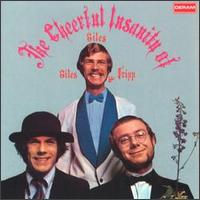 Giles,
Giles and Fripp: The
Cheerful Insanity of Giles, Giles and Fripp (Sept. 1968),
***1/2
Giles,
Giles and Fripp: The
Cheerful Insanity of Giles, Giles and Fripp (Sept. 1968),
***1/2
Undeservedly
reduced to a footnote in King Crimson's history, GG&F were most
likely the first group to have a straight jazz/classical guitarist in
their midst. It helped that that guitarist was
Fripp, who was about as good as they come, the drummer
was Michael Giles who became one of the
best progressive rock
drummers and brother Peter had an intentionally droll voice and a
splendid bass tone ("Newly-Weds").
As for GG&F, their music is, well, different. Cheerful Insanity
is
progressive and not progressive at the same time, with little
pretentiousness, lots of goofiness ("stories" run between
tracks), and serious works like the
multi-part "Suite No. 1" with beautiful guitar/piano
interplay. Nothing
is rock-based or blues-based,
relying on the aforementioned jazz and rock. Most everything
is
low-key, and there's a definite wave of nostalgia throughout the
record, as seen in the pastoral "Thursday Morning" and the
oh-so-sincere music hall of "The Sun Is Shining" (complete
with strings and female backing vocals.) But
it is Cheerful
Insanity for a reason, such as tracks
like "The Crukster",
a hilarious send-up of the Moody Blues'
serious poetry intros and outros. Most
of the lyrics are
delightfully fun nonsense or humorous ("How Do They Know"
which contains my favorite mis-heard line in a chorus - "The
dust is sucking your eyes"). Occasionally they lose their
way, as on the "Elephant Song" which could be called the
"bizarre verse punch-line song", and the unfortunate psych
jam that ends the record ("Erudite Eyes"). "Call
Tomorrow" is decidedly weird --psychedelic Wurlitzer?
Feel
fortunate it is in-print, and comes with the best outtake
ever recorded, the hilarious "She Is Loaded".
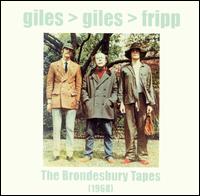 Giles,
Giles and Fripp: The
Brondesbury Tapes (rec.
1967-68, rel. 2004)
Giles,
Giles and Fripp: The
Brondesbury Tapes (rec.
1967-68, rel. 2004)
Cheerful
Insanity fans will find this essential - home
recordings, mainly
clustered around the Giles, Giles, Fripp and McDonald era.
During the later days of
GG&F, Ian McDonald joined them, as well as his girlfriend
Judy Dyble. McDonald was, of course, a bit of a jazz-head in his
playing, but also brought a strong folk component as well. Dyble
matched this; she was a more traditional folk singer previously with
Fairport Convention who provided a good alternative to Peter Giles'
affected deadpan. Behind the scenes, Pete Sinfield also showed up
around this period. GG&F still retained their breezy retro
feeling, not akin to an English analogue of Dan Hicks, but added in a
good dollop of folk and experimentation as well. Brondesbury
also shows Fripp as a much more traditional electric guitarist in
places "Why Don't You Just Drop In" or "Wonderland",
trying various styles of distortion when not using a straight jazz
tone.
Cheerful
Insanity's material was usually very structured: Giles pop
tunes,
or Fripp's more elaborate works. The
Brondesbury Tapes has
its
share of home versions ("Digging My Lawn", "Suite No.
1", "Newlyweds") but they are the least interesting
tracks. Try some unheard Peter Giles tunes instead: starting with the
very early and very odd "Hypocrite", with Giles dryly
observing that "your friends say you are hip; I understand it's
short for hippo," while friend Al Kirtly plinking on piano in
the background. The staggered harmonies and resolution on "Murder"
are also a treat, and of course the song ponders who would murder.
Giles' hilarious "She Is Loaded" also shows up, similar to
the studio version already released.
While Giles'
songs are closer their album's material, the Tapes also has a
brace of more open
ended tracks:
a version of "Erudite Eyes" foreshadowing King Crimson as
McDonald joins the mix, as well as a couple of fascinating takes of
"I Talk to the Wind" (one with Dyble on lead). The
McDonald/Sinfield songwriting was strong right from the start, joining
the Cheerful Insanity
vibe with less structure on the awesome
"Make It Today" while the gentle "Under the Sky"
with Dyble draws more on folk. In contrast, Fripp's works are
more
curiosities. "Passages of Time" is built around around the
common Spanish chord sequence, with Dyble singing that she can "see
into passages of time" while odd distorted noises are mixed in.
Fripp is also responsible for "Why Don't You Just Drop In"
more of a blues song complaining about hippies, which sounds like a
Russian folk song in the verses, while the wordless chorus is lifted
straight from the traditional "Misty". (It later appeared
as part of "The Letters" on Islands). "Wonderland"
is the most odd, blowing through a long skat section. The exception
is "Plastic Pennies", a wholesome, commercial pop song
heavily utilizing Dyble singing about mainly about children. Perish
the thought it might have been released and made a hit single -
making GG&F a one-hit wonder and killing King
Crimson.
Several tracks
get repeated, but the album is over 70 minutes long. If this were cut
down to a single album, it would be as good, if not better than
Cheerful Insanity,
but such is an archival recording's nature.
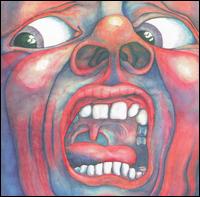 In
The Court of the Crimson King, An Observation by King Crimson (Oct. 1969),
****1/2
In
The Court of the Crimson King, An Observation by King Crimson (Oct. 1969),
****1/2
Sometimes
I find labels useful. They can help a person understand what
I'm talking about by referring to some common vision of whatever the
label is. "Progressive rock" is one these labels.
The problem is when what people think a label means and what its
definition is are two different things. I recently read
someone's comment that they didn't consider King Crimson to play
prog-rock because Crimson sounded different from Genesis and Yes.
Despite that I find that comment false, it ignores what progressive
rock is. In the early days progressive rock was a lot more
diverse than its eventual bloated corpse would indicate. In
the Court is
a rock record, but not from the same background as other rock
records. The band mainly drew on jazz, but with some
classical
thrown in for good measure. The main difference between
Crimson
and other groups is multi-instrumentalist McDonald, who
contributes saxes, flutes, other woodwinds and mellotron. No
other major jazz-rock group was experimenting with saxophones or
lutes at this time, which gives them a unique sound. Add
McDonald to
Giles, Giles & Fripp and there goes the neighborhood, in a good
way. The album opens with "21st Century
Schizoid Man", a track that paved the way for Yes to do such
things as "Heart of the Sunrise". It is fast paced
fusion, with Fripp turned up loud and McDonald driving saxes to
madness. On the quieter side of things, McDonald's has a
great
flute song "I Talk To the Wind", while "Moonchild"
is so quiet it turns into a rather infamous and boring sound collage
(the only thing preventing this album from being perfect).
There are also two moody mellotron epics enhanced by Lake's dramatic
singing ("Epitaph" and the title track). Lyricist Pete
Sinfield replaced GG&F's goofiness with beautiful literary
imagery, but was still very clear and direct (so not cryptic like Ian
Anderson, or the muddy vagueness of Yes).
Let me express my admiration for Michael Giles one more time, as he is
one of the drum gods. Finally, newcomer Greg Lake was
a surprisingly good replacement for the other Giles, and a fantastic
singer. But McDonald is the difference maker, as he provides
the foundation for every song, as well as many of the solos.
Fripp is more in the background, but his presence (and writing) is
certainly felt.
So, where they don't sound like Yes or Genesis as much as others may
(the Nice), they at least set the standards for prog-rock in
scope.
This is a fantastic album. Produced by the group.
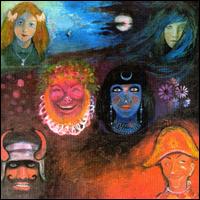 In
the Wake of Poseidon (May 1970),
***
In
the Wake of Poseidon (May 1970),
***
Those that fail to
learn from history, are doomed to repeat it. Well, Fripp
and Sinfield must have forgotten their previous album because Poseidon
sounds like exactly like it. Except vastly
inferior. Confused? Let's clear this up
then. Poseidon
is almost a track
by track recreation of the band's debut, but the songs and playing
are weaker. A lack of substance is quite apparent, perhaps
due
to the fact that McDonald had quit, his duties split between
Mel Collins (sax, flute) and Fripp on mellotron. Even
Poseidon's
better tracks feel needlessly extended ("In the
Wake of Poseidon", "Pictures of a City") and Fripp
coughs up one ungodly eleven+ minute suite (the appropriately named
"Devil's Triangle") which ranges from boring to annoying.
The better moments? The bizarre "Cat Food" has some
non-mythical/historical lyrics from Sinfield to go along with its
zany jazz-rock, while "Cadence and Cascade" is a pretty,
classical ballad undeterred by the vague vocals of newcomer Gordon
Haskell. Not that Lake is gone - he was in the process of
leaving, which means he
only did the
vocals, with Peter Giles
filling
in on bass. Of course, Peter's brother Michael had also quit,
but that doesn't stop him from still playing either. Keith
Tippett is around on piano as well, just to confuse matters.
So if you want the big picture it runs something like this - Fripp
tries to stretch out their tour material and then stop up the gaps
with a couple of decent songs and a thrice-repeated trifle
("Peace"). Produced by Fripp and Sinfield.
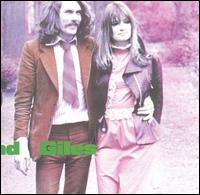 McDonald
and Giles: McDonald
and
Giles (1970),
***
McDonald
and Giles: McDonald
and
Giles (1970),
***
Not
exactly household names, the drumming Giles and McDonald,
the multi-instrument guy, quit and recorded this album with the help
of Peter Giles (the non-drumming
Giles). King Crimson's original sound
was thus divided: Fripp kept the technical more symphonic and overtly
jazzy aspects, and M&G went with the folky, light, even poppy
side ("Flight of the Ibis" has the original melody to
"Cadence and Cascade"). One reason may be that
Fripp kept the mellotron in the divorce,
so McDonald plays more guitar, along with piano, flute, sax and the
rest. On the more practical side, McDonald's voice isn't as
strong as the Crimson vocalists, and is better suited to this type of
material. It is clear that this is more of a mainstream album
from the beginning - the opening of "Suite in C" sounds
directly inspired by Abbey
Road,
and McDonald shows a strong folk bent (the gentle ballad "Is She
Waiting"). For those who like labels, I would say that
McDonald
and Giles is
more pop-progressive rock, like Yes's
debut.
Lyrically, M&G
is substantially different from Crimson as
well; McDonald's lyrics are distinctly romantic and Giles brings
forth a happy idealistic song from 1967 that demonstrates its age
("Tomorrow's People - The Children of Today"). Even
the Sinfield-penned suite which occupies the album's second half
("Birdman") is a distinctly whimsical tale of a man
constructing wings to fly. The main difference between this
and
KC is that McDonald is not as strong a soloist when he is only
playing off of himself, even if he overdubs a great deal.
Instead, he and the brothers Giles have to keep shifting the music to
keep it interesting, and even employ orchestration at one point
("Suite in C", which is where with the addition of Steve
Winwood they
sound like a Canterbury band for a part). This strategy works
-
even when it leads to unpredictable results (the solo line in "Flight
of the Ibis" is on zither!),
and they get into good grooves ("Birdman: The Workshop").
In fact, if I were a DJ there are plenty of great
bouncy instrumental stretches to swipe. The only
problems
come up when they decide not to shift, and instead
go for slow buildups which need more than three men to sustain them
("Birdman Flies!" and the closing "Birdman-The
Reflection"). All in all, a good album, but one that lacks
a main attracting point. Self-produced.
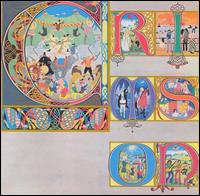 Lizard
(Dec.
1970), **1/2
Lizard
(Dec.
1970), **1/2
The first major shift of King Crimson's sound; henceforth its
sound would be ever-changing. Apparently, Fripp's idea was to meld the
more traditional classical and prog sounds of their first two albums
with looser structure and sound. To do so, he called in the
auxiliaries - Keith Tippett and his horns and woodwind players. The
opening track, "Cirkus", is a microcosm of the whole affair -
interpolating Fripp's classical guitar and Collins' short, lilting
and jazzy sax lines, when not utilizing the typical Crimson
multi-layered sound. Fripp largely avoided electric guitar
solos -
only the end of "The Battle of Glass Tears" foreshadows his
later excellence, sticking with mellotron and a nimble classical
style. Their older sounds did not disappear, but this Crimson
band
does not take off, so part of "The Battle of Glass Tears"
features a bluesy sax riff like "20th Century",
but only as a backdrop, not a propeller. The band's
epic side -
represented here on the second half's songs concerning Prince Rupert,
often takes on the measured tone of a movie soundtrack, with the clear
lines of the guests pacing "Bolero". While this was very
adventurous, this incarnation of Crimson sounds like a bad
jazz-rock band sometimes, such as on Sinfield's Beatles tribute "Happy
Family". New singer Gordon Haskell is a low-pitched, open
throated singer; he sounds like he has a cold most of the time.
Songs that may have passed with Lake do not with Haskell (the
classical ballad "Lady of the Dancing Water"), who gets
scant help from Sinfield's often oblique lyrics on "Indoor
Games". It all never quite fails, and never quite succeeds.
Amidst all this adventure, Fripp and Sinfield did have the wisdom to
ask Jon Anderson of Yes to lend his voice to "Prince Rupert
Awakes" - a nice piece of more ordinary classical themed
prog-rock (and with an identifiable story), with Tippett doing a bit
of Emerson-like playing, although Fripp (delightfully) adds in some
Steve Stills-style backwards guitar lines on the choruses. The result
is the album's best track, but also its least ambitious, even if it
was far more complex than contemporaneous Yes. Lizard
broke
with the past, but Crimson had not achieved a reliable sound.
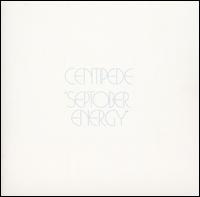 Centipede:
Septober Energy
(1971), *
Centipede:
Septober Energy
(1971), *
The Beast with a
Hundred Arms in a massive project: a
double-album with a 50 member jazz-rock orchestra performing a work by
Keith Tippett. Fripp produced, but the pianist organized
everything, and it featured most of his group, old Crimson
hands McDonald and Burrell, Soft Machinists, violins, cellos, more
horns, and Brian
Godding (brother
of Tippett's wife, Julie Driscoll) as the sole guitarist.
Despite a lineup sure to place well in Fantasy Jazz-Rock
Rotisserie Leagues, Septober
Energy is a bloated mess. There are good
passages (buried alive) here and there, and Fripp may have saved some
ideas for the Larks'
Tongue-era (the opening noises, the mostly instrumental
approach). Yet, the album
commits
almost every musical sin: overlong jams, avant-noise, section
wank episodes, no apparent order to pieces which approach and retreat,
and wordless vocals occasionally deviating into hippie babble lyrics --
all
dumped into one track carved up on four LP sides (the music doesn't
reflect the sides for the most part either). Maybe
Tippett was trying to recreate the large jazz band format for the early
70s; maybe he was trying to merge experimental hippie stuff
like Joseph Byrd with contemporary jazz; maybe he was trying to further
explore the symphony / rock band sound which
was commercially successful for Atom
Heart Mother and Deep Purple's Concerto.
Whatever he was trying to do, listening to Septober Energy is
like watching a peacock preen itself and prance about before a mirror:
there are some moments of beauty, but even Narcissus would have drowned
himself well before the second LP.
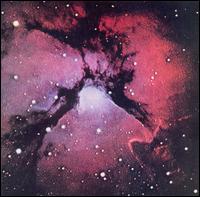 Islands
(Dec.
1971), **
Islands
(Dec.
1971), **
Slower,
with more blues(!), Islands
is
a collection of good ideas more than a good album. Fripp, having
produced Centipede, broadened Crimson's
ambitions as well, even if he left Sinfield to produce this. Thus,
Islands
involves
not only Tippett and friends again, but an orchestra in places. This
allows Crimson to expand on Lizard's
dichotomous approach - "Formentera Lady" switches between
orchestral and electric backing, and "Prelude: Song of the
Gulls" is an out and out classical work. Islands also shares
Lizard's
"one big crazy jazz session" feel in places like
"Formentera Lady" and "The Letters", and he lets
the guests do most of the work. He also pursues the opposite -
instrumental tracks that sound composed - "Prelude: Song of the
Gulls" obviously, while "Sailor's Tale" is the album's
bright spot: a bit of modern composition with dramatic musical
phrasing, as Fripp uses the mellotron to full effect. Yet, the rhythm
section is the Crimson's most basic yet; Fripp taught Boz to play
bass in a matter of weeks, and Ian Wallace lacked the technical skill
of his predecessors. This does make them good backing for the album's
guests, however, which is something.
Island's
largest change is that Sinfield dropped his fantasy lyrics entirely,
but his placid observational lyrics are worse: pallid tales of women
("Ladies of the Road", "Formentera Lady") and the
loner's lament of the title track ("Touch my island / touch me"
- ack). Burrell's singing matches the material - deliberate,
restricted and far easier than Haskell. Accordingly, despite their
rock credentials, the band rarely kicks it - Boz raises his voice
once on "The Letters" and "Islands" crawls along
for almost twelve minutes. Many of the album's musical
ideas are
not new - "The Letters" combines the old GG&F song "Why
Don't You Just Drop In" with slo-mo "21st Century"
horns, "Ladies of the Road" owes a lot to the late Beatles
interpretation of the blues, as well as McDonald & Giles'
"Suite
in C". Fripp wanted to push boundaries and re-invent the
band, but at this point his collections of ideas and attitudes
did not coalesce, and Islands
is possibly Crimson's weakest studio
album.
Earthbound
(Jun.
1972)
A
live album with the Islands
crew,
reportedly so wretched it was not released in the United States.
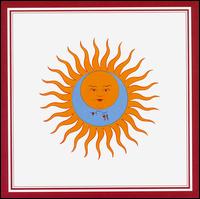 Larks'
Tongues in Aspic (Mar. 1973),
****
Larks'
Tongues in Aspic (Mar. 1973),
****
This
is truly, truly
progressive
rock.
If we go way back to beginning, progressive rock was an attempt to
merge classical music and rock music. Prog-rock, first
explored
by the Nice, was actually regressive
in
nature -
putting traditional classical motifs into rock music and then
emphasizing longer solos and technical precision (think of Keith
Emerson as Bartlett's Book of Classical Quotations). Others
took the forms of classical music and applied them to rock
music.
The first King Crimson album was something different - an attempt at
rock music without the rock. Many groups then proceeded to
put
the rock back in quite successfully. The title track on this
album is actually forward looking - progressive. I cannot
describe it in any way other than as modern classical music, as Fripp
finally found an approach that successfully merge his classical and
modern impulses. Along with him were a fantastic rhythm
section
(John Wetton on bass/vocals and Bill
Bruford
on
drums), a
violinist (David Cross), and a percussionist (Jamie Muir).
Some
passages are creepy, some are beautiful, but all the musicians acquit
themselves well and there is precious little limelight
hogging.
Before anyone goes off thinking that a percussionist is some sort of
luxury item, let's make it clear that Muir is essential to this
record. His use of tuned percussion is very intriguing, and
helps give them an edge over other groups. For this
incarnation
of King Crimson sounds nothing like other groups, as far as I can
tell. It rarely even sounds like prior Crimson, the exception
being a
beautiful entry in the line of Fripp's acoustic ballads ("Book
of Saturdays") and parts of "Exiles". However,
aside from both parts of the title track and "Book of Saturdays"
the rest of the album doesn't have the same focus. Wetton has
one of those voices that sounds influenced by alcohol and cigarettes
of days past, but hasn't submitted to it and still really
sings.
Lyricist Richard Palmer-James is a poet of romantic reminisces, and
he does quite well. Fripp varies his guitar tone
quite a
bit from controlled distortion, which can only be described as the
sonic equivalent to the bouncing of light in a fiber optic cable, to
the open harshness of a metal group (the excellent "Larks'
Tongues in Aspic Part II"). A fascinating album, mainly
for its sound and with some excellent tracks as well.
Self-produced.
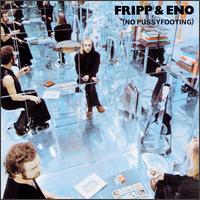 Brian
Eno & Robert Fripp: No
Pussyfooting (1973)
Brian
Eno & Robert Fripp: No
Pussyfooting (1973)
First
of their experimental albums - playing against a multiple delay, a la
Terry Riley or Neu!.
The tape cycle creates a natural rhythm, but the
music waxes and wanes as opposed to relying on a melody. One
of
the
beginnings of ambient music, which is a polite way of saying that it
makes excellent background music. Fripp later explored this
music
with Eno on Evening Star,
and his early 80s solo works using
Frippertronics or one of its permutations. More susceptible
to a binary rating than a standard one - you may love it or hate it,
but I suspect the outcome is largely dependant on the circumstances of
listening, rather than the music itself.
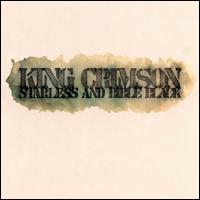 Starless
and Bible Black (Feb. 1974),
**1/2
Starless
and Bible Black (Feb. 1974),
**1/2
Most
of this was recorded live, with some overdubs added later.
What
does King Crimson sound like live, you ask? Imagine an
unplanned progressive-rock epic that maintains the same texture
throughout. But you only hear pieces, further
adding to the confusion. In other words, Starless
and Bible Black is
dark and creepy, occasionally brilliant, but mainly
just unfocused. Sure, the playing is top-notch, but
the more
structured songs ("The Great Deceiver", "Lament",
the old-world feel of "The Night Watch") are
all misfire. The rest are jams of varying length and
creepiness. Nothing akin to the multi-part beauty of "Larks'
Tongues in Aspic" is really attempted, as the group seems
content with only playing off-the-cuff. As with most
improvisations, some are good (the peaceful "Trio" of
violin/mellotron/bass, or "We'll Let You Know" with it's
jerky bass line) while a couple are just aimless (the title track,
"The Mincer"). Muir is gone, and Fripp gets most of
the spotlight, coming up with another one his signature fast fingered
"dark" guitar pieces with Cross hooking up a distortion
pedal to his violin (the instrumental "Fracture" - easily
the best track on here). In the end the album doesn't have
much
in the way of substance, but plenty of atmosphere to spare.
Music for the highbrow haunted house. Produced by the band.
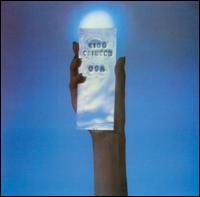 USA
(rec.
1974, rel. Apr 1975),
***1/2
(or
better)
USA
(rec.
1974, rel. Apr 1975),
***1/2
(or
better)
An
excellent live album from the Cross lineup, and the best Crimso live
product before Fripp released a bazillion concerts through
mail-order. The band was loud and well-rehearsed, making renditions
of their mainly Larks'
Tongue-era
tracks really tick ("LTIA Volume II", "Exiles",
"Easy Money"). Cross is a bit lost in the mix, venturing
between violin and mellotron, with the latter often featured as
undergrowth. To compensate, Eddie Jobson overdubbed violin
later; easy enough to see why Cross left before Red.
Unlike the Starless Crimson,
USA's
one unscripted song ("Asbury Park") is a jam, rather than an
aural piece of shattered glass, and well, like many jams, doesn't go
far, and doesn't need to. Fripp shows off his dexterity at will
through it, and keep in mind the loud, and buzzed-up sound Crimson
sported at the time. Finally, the band ends with a rendition of "21st
Century Schizoid Man" and it's a rocking one; this lineup could
play, they could belt, they were nimble as a watchmaker and they
could do the grand old lady of the Crimson canon justice. "R.I.P."
the back cover states; little did we know Crimson had more lives than
Rocky Balboa had bouts. The final release (after Red)
of this particular incarnation, and it wins the match.
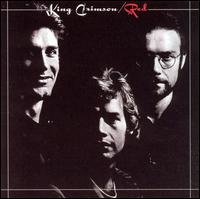 Red
(Oct.
1974), ****
Red
(Oct.
1974), ****
In
listening to this album, one can't help wondering if the title was
influenced by the famous Mars portion of Holst's The
Planets,
which King Crimson used to perform live. Not that Red
borrows
musical themes from that work, but it carries the same dark and
powerful sound of Holst's piece. The title track is the
perfect
example, with loud, distorted instruments, a brooding riff, and
unexpected symphonic break. Most of the album can be seen as
offspring of early Crimson song styles, albeit turned dark and
twisted. For example, "Fallen Angel" might be a
descendant of more ballad-like songs such as "I Talk to the
Wind", while the wonderful "Starless" is definitely
another creepy mellotron enhanced epic along the lines of "Epitaph"
(complete with Ian McDonald sax work). As for the excellent
"One More Red Nightmare", it continues the same ominous
tone of "Red," but with a syncopated rhythm and something
like hand claps that make it sound like a funk song. Only the
instrumental "Providence" does not keep up, opening
with Cross's violin meandering like a creepy horror soundtrack
before turning into a loose jam whose reason for existence may be
only to show that John Wetton can both sing and play the bass pretty
well. As for Bruford, he is top notch throughout the
album, contributing excellent fills and percussion, leading one to
question (as everyone else has) how Yes
let
him go.
Fripp does not ever really show off, shying away from solos
and playing a (literally) mean guitar (his creepy same note
extravaganzas in "Starless"). Fripp, Wetton and
Bruford are the only real band members left, with alumni Cross, Ian
McDonald, as well as the Lizard/Islands
horn
section of Collins, Miller and Charig all doing admirable
jobs.
This album is remarkably relevant even today, as it sounds exactly
like the sort of partially avant-garde things they play on community
radio. Self-produced.
Brian
Eno & Robert Fripp: Evening
Star (1975)
More ambient music.
 U.K.:
U.K.
(1978),
**1/2
U.K.:
U.K.
(1978),
**1/2
An attempt to
make a prog/fusion album that combined the distinctive talents and
ambitions of its players with a friendly sheen. It was not an album
for neophytes, instead aimed more at established listeners who wanted
a heavier, more intense album than what Yes or ELP concurrently made.
U.K. was a supergroup of sorts - the ex-Crimson Bruford/Wetton rhythm
section, former Roxy Music member Eddie Jobson on keyboards/electric
violin and Allan Holdsworth on guitar. Their technique is admirable,
with Holdsworth's guitar style an interesting mix of bent notes and
speed, such that his solos resemble jazz saxophone lines ("Thirty
Years"). All told, the pieces fit together well, but U.K. is
firmly stuck to its era.
The album's
faults lie in both its cold, synthetic feeling, a result of Jobson's
synthesizers, and the shiny production. It's not Jobson's fault that
his state of the art equipment produced sounds later imitated by
1990s computer games, or could be music for Star
Wars knockoffs
(the opening of "Alaska" among other synthetic wonders).
Similarly, the band's musical cues are derived from earlier prog rock
- Jobson's electronic violin or symphonic synthesizers ("In the
Dead of Night", "Thirty Years"), Crimson's dank
rhythms or arrhythmia, Holdsworth's sporadic classical guitar use
("Thirty Years", the Jack Bruce-like "Nevermore")
a
la Steve
Howe, or the plastic classical reproduction on "Presto
Vivace and Reprise". The lone acceptance of modern trends is on
"Time to Kill" where the band kicks in a quasi-disco beat
under Wetton's vocals, making it U.K.'s most mainstream track. Like
almost all prog music the lyrics are a disaster: "Thirty Years"
speaks of "chasing rainbows," and "Mental Medication"
is another offender. For every moment the music is interesting or
engaging (parts of "In the Dead of Light", "Nevermore",
"Time to Kill", cluster-bomb rhythms in "Mental
Mediation") there are several dull, warped or bombastic ones.
The net result is a failure, an unemotional distant work with
grandiose aims and synthesizers, although prog geeks will love it.
Self-produced.
Bruford:
Feels
Good to Me (1978)
Bruford
solo debut. I do not have this.
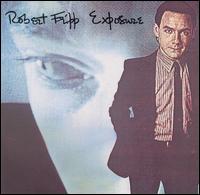 Robert Fripp: Exposure
(Apr. 1979),
***1/2
Robert Fripp: Exposure
(Apr. 1979),
***1/2
While
Bruford was off making prog-rock with friends, Fripp had dropped out of
sight; he attended a philosophic/spiritual institute, hung out with
Eno and Bowie,
played
with Peter Gabriel and moved to downtown NY. (Check out Eric Tamm's
free
book for more information.) No longer
Fripp-of-the-technical-prog, he was now becoming
Fripp-of-the-avant-pop, which makes sense if you factor in his
intervening experiences.
Fripp
intended Exposure
to
be part of a trilogy, starting with Daryl Hall's Sacred
Songs,
and then Peter Gabriel's second self-titled album. The album is
as much an art piece as it is a music album. Fripp was always an
intellectual musician, and he became interested in the relationship
between the artist and the audience at a performance, beyond the
music itself.
He toured with his Frippertronics to achieve an immediacy of sound
that asked nothing of the audience. The result was layers of looped
guitars, back when that was difficult, as he soloed off his past. But
notice his shift - from making music and songs, to his focus on
performance - which dovetails nicely with the NY art scene of which
he was now a part.
Not that performance was not part of any good artist's presentation
(ex. the Who's destructive antics), but that was usually separated
from their recordings. Live albums, of course, are different, but
rarely used as the foundation for a studio production,
or the mixed nature of Frippertronics, which made the public
performance the recording studio for new, improvised work.
It's
hard to pin Exposure
down,
as Fripp was mainly concerned with synthesizing his disparate
influences. Hall was the main vocalist, but Fripp was forced to bring
in others: often Terry Roche and an overwrought Peter Hammill.
Fripp's style now combined his Crimson obtuseness with the ambience
and tape loops of his works with Brian Eno (Frippertronics), which
built up layers of treated sound as Fripp played over his own delay.
Place these sound production/production techniques in a pop music
setting (a la Hall) and you get the underpinning for Sacred
Songs and
Exposure.
Certainly it's all a bit intellectual
because, well, this is still tight-lipped Robert Fripp we're talking
about, even if he was collaborating with Daryl Hall. All the aspects of
his career appear - from Red-style
prog ("Breathless" with Frippertronic backing) to contemporary sound
clip manipulation
(various philosophical inserts, the clever creation of a family row
in "NY3", "First Inaugural Address To The I.A.C.E.
Sherborne House" at inaudible speed), harder rock (but not hard
rock) songs like "Disengage" and "I May Not Have
Enough of Me But I've Had Enough of You," to the straight
Frippertronics of "Water Music I" and "Water Music
II". Every King Crimson album had at least one classical ballad;
on Exposure
this interest manifests as less classical, more open songs
like
"Mary" and the great "North Star", both akin to
Discipline's
"Matte
Kudesai." While certain songs stand out - a bare version of Peter
Gabriel's ("Here Comes the Flood" a piano
song, with excellent lyrics),
the aforementioned "Breathless", a Talking Heads-like slow
funk song with manipulated vocals ("Exposure") - but the
album is meant to be taken at a whole. Fripp usually relied on others
for lyrics, and Exposure
mostly
uses
Joanna Walton's personal, downcast poetry, except for the found
speech which comprises and "NY3". Fripp's own interesting
lyrics for "You Burn Me Up I'm a Cigarette" show him
wrestling with his spiritual studies. Fripp's production techniques -
the Frippertronics and the sound cuts, seem old hat now, but
were
cutting edge. The
result is an album that ebbs and flows from idea to idea, and setting
to setting, and shows Fripp's music in transition.
UK:
Danger
Money (1979)
Bruford
and Holdsworth had left, replaced by Terry Bozzio (ex-Zappa).
Bruford:
One of a
Kind (1979)
This
I have.
Bruford:
Gradually
Going Tornado (1980)
Fusiony.
Blah blah blah.
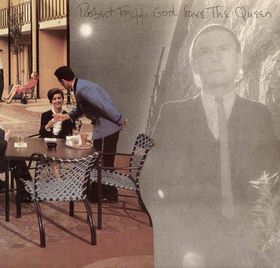 Robert
Fripp: God
Save the
Queen/Under Heavy Manners (Mar.
1980),
**
Robert
Fripp: God
Save the
Queen/Under Heavy Manners (Mar.
1980),
**
Half
Frippertronics (God
Save the Queen),
half "Discotronics" aka Frippertronics with a beat (Under
Heavy Manners).
The GSTQ
half
is what it is: you listen to it, and later think "Gee, that was
okay background music, but I can't remember anything about it."
The Discotronics
half is better, because "Under Heavy Manners" is (or like?) a
pop song with David Byrne singing, even if Fripp's lyrics mostly
catalog of -ism words. The remaining track - "The Zero of the
Signified" is Frippertronics with a rhythm section and Fripp's
guitar arpeggios. For over twelve minutes. The lengthy liner notes
have more substance than the album. An intellectual experiment. Pass.
The League of
Gentlemen: The League of
Gentlemen (Mar. 1981)
Fripp
and others.
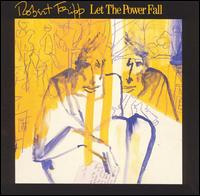 Robert Fripp: Let the Power Fall
(rec. 1979, rel. Apr. 1981)
Robert Fripp: Let the Power Fall
(rec. 1979, rel. Apr. 1981)
"1981 is the year of
the Fripp" - so said the promo film for Exposure.
Let the Power
Fall is an entire album of Frippertronics
culled from his solo Frippertronics tour in 1979. With new
notes replacing old ones (or over loops), it is interesting
how he
creates chords and directs the music piecemeal. The whole
thing
sounds like a guitar version of Terry Riley's Poppy Nogood and the
Phantom Band, except better. It strikes me as far better
than God Save
the Queen
(for whatever reason), and makes excellent Music for Doing Other Things.
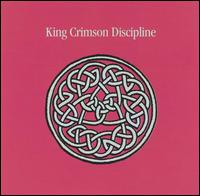 Discipline
(Sept.
1981), ****1/2
Discipline
(Sept.
1981), ****1/2
The
Anglo-American incarnation reunited Fripp with Bruford, along with
bassist Tony Levin and guitarist/singer Adrian Belew. This
incarnation merges Fripp's solo work with the Talking Heads
style music Eno (and Fripp) was involved in:
poly-rhythms, African beats, guitars
processed to various ends (the most amusing of which is the Howe-like
seagull noises on the easygoing "Matte Kudasai") and a bit
of a sheen in the production, but still feels like King Crimson
underneath it all. A refurbished, modernized King Crimson to
be
sure, but the moniker is still appropriate. Adrian Belew is a
warm vocalist (like Wetton was), but his guitar Levin's
bass/Chapman stick make interlocked rhythms with Fripp, as well as the
latter's insanely fast runs and arpeggios where synths would
be
on contemporary records. The band still has a highly
technical
instrumental feel, but like the album's name, a high degree of
control and precision goes into the music (the amazing
"Indiscipline", "Discipline"). Bruford's
drumming has been almost entirely re-molded - stripped down, more
world-beat, with a few returns to his old self here and
there.
The lyrics, written by the band, have an appropriate touch of
irreverence to them ("Elephant Talk", "Indiscipline"),
although they do spoil one track by letting Belew ramble on telling a
story ("Thela Hun Ginjeet"). Given Fripp's desire to keep
pushing new boundaries, this was a success for him.
Produced by the group and Rhett Davies.
Beat
(Jan. 1982)
Three
of a Perfect
Pair (Mar. 1984)
Last
of their albums in the 1980s.
Crimson
was
resurrected in 1994, and have released several albums since.
 Giles,
Giles and Fripp: The
Cheerful Insanity of Giles, Giles and Fripp (Sept. 1968),
***1/2
Giles,
Giles and Fripp: The
Cheerful Insanity of Giles, Giles and Fripp (Sept. 1968),
***1/2
 Giles,
Giles and Fripp: The
Brondesbury Tapes (rec.
1967-68, rel. 2004)
Giles,
Giles and Fripp: The
Brondesbury Tapes (rec.
1967-68, rel. 2004) In
The Court of the Crimson King, An Observation by King Crimson (Oct. 1969),
****1/2
In
The Court of the Crimson King, An Observation by King Crimson (Oct. 1969),
****1/2
 In
the Wake of Poseidon (May 1970),
***
In
the Wake of Poseidon (May 1970),
*** McDonald
and Giles: McDonald
and
Giles (1970),
***
McDonald
and Giles: McDonald
and
Giles (1970),
*** Lizard
(Dec.
1970), **1/2
Lizard
(Dec.
1970), **1/2 Centipede:
Centipede:
 Islands
(Dec.
1971), **
Islands
(Dec.
1971), ** Larks'
Tongues in Aspic (Mar. 1973),
****
Larks'
Tongues in Aspic (Mar. 1973),
**** Brian
Eno & Robert Fripp:
Brian
Eno & Robert Fripp:
 USA
(rec.
1974, rel. Apr 1975),
***1/2
USA
(rec.
1974, rel. Apr 1975),
***1/2
 Red
(Oct.
1974), ****
Red
(Oct.
1974), ****
 U.K.:
U.K.
(1978),
**1/2
U.K.:
U.K.
(1978),
**1/2


 Discipline
(Sept.
1981),
Discipline
(Sept.
1981),